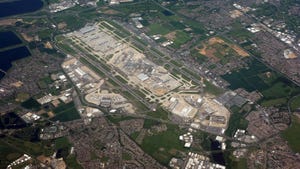Data Center World Keynote Interview With Oracle's Burcin KaplanogluData Center World Keynote Interview With Oracle's Burcin Kaplanoglu
Ahead of his keynote lecture at Data Center World 2023, Oracle Industry Lab's Burcin Kaplanoglu talks with Bill Kleyman about the current state and future of the data center industry.

I’ve known Dr. Burcin Kaplanoglu for a number of years and calling him an industry visionary would be an understatement. His perspective on our industry is why I am so excited to have him keynote our conference. Ahead of his featured keynote talk at AFCOM Data Center World 2023 in Austin, we met with Kaplanoglu, from Oracle to get his perspective on our connected industry. Kaplanoglu is a recognized industry technologist, innovator, thought leader, and keynote speaker. He is leading innovation for the Oracle Vertical Industries and is the Co-Founder of Oracle Industry Labs.

NEW3_Burcin-Kaplanoglu_501942_1678724993
At Data Center World this year, Kaplanoglu's keynote will dive into the latest innovations and trials with robotics in the data center, how data is being used to bring capacity online faster and far more sustainably, and how data-driven solutions will impact the future of the data center.
Be sure to join us for a fantastic session! And now, a chat with Kaplanoglu.
Data Center Knowledge: How would you describe the current state of the talent gap that has impacted the data center industry? What steps can the technology industry take now to mitigate this labor crunch?
Burcin Kaplanoglu: This talent shortage is being felt across industries, and the data center industry is no different. Data center workers are at the heart of how things get done, and they play a fundamental role in helping businesses thrive in a changing market landscape. The community needs diverse professionals who can support global digital expansion and new roles that will be created in step with emerging technologies and evolving trends in the industry.
Some of the activities at a data center can be repetitive. Companies are increasingly turning to automation to manage some of the common data center processes, including monitoring, repair, and app delivery, to help increase data center productivity and adaptability. This can help mitigate the lack of labor entering the industry, as well as the loss of institutional knowledge that occurs when members of the workforce retire.
DCK: What emerging trends should data center operators pay closer attention to in 2023?
Kaplanoglu: Data centers will need to support the growing adoption of cloud technology. As more people spend more time online, and as AI and machine learning is more widely adopted, data centers will need to support demand with additional servers and low-latency connectivity options. The intense nature of AI and machine learning workloads will need larger amounts of data processing than previous conventional methods, necessitating a shift in data center architecture. This will include more sophisticated cooling systems to accommodate the higher output, as well as increased amounts of computational, memory, and storage resources over a large number of computers.
Data centers will simultaneously be called to use greener technologies that can help support their sustainably goals.
DCK: What recent sustainability trends excite you most?
Kaplanoglu: Most companies by now have outlined their environmental, social, and governance goals, detailing how they plan to move to greener technologies and help curb climate change. Looking forward, some industries are not only looking to meet those goals, but to exceed them. To help assist in that process, we recently built an Oracle Industry Lab in Reading, England, focused on achieving higher levels of sustainability. The lab is set to drive sustainability, mobility, and accessibility use cases with customers and partners.
Intelligent technology platforms that utilize AI and machine learning and are purpose-built for industries can help improve decision-making. Combined with the increased adoption of automation, this will improve operational efficiency, help mitigate risks, and assist in lowering carbon emissions. These technologies can help reduce waste and costly repetition or rework by visualizing the end result before work begins.
Companies have constantly been looking for ways to make their businesses more sustainable, and data analysis can be part of the solution. Data analytics can change how work is completed across industries, helping companies streamline processes and making them more efficient.
Data can help teams measure the sustainability of current methods and leverage those insights to show sustainability throughout the entire work process. When employed correctly, data can play a large role in propelling industries toward long-term sustainable development methods.
DCK: One last question, what are you the most excited to see or do at DCW?
Kaplanoglu: I’m most looking forward to spending time with customers and other leaders in the industry. It is a one-of-a-kind forum where it will be exciting to discuss industry trends. I will be presenting how robots and AI will change digital infrastructure, and introducing the Oracle Industry Lab and some of the key use cases that we have developed, from construction to operations.
About the Author
You May Also Like









